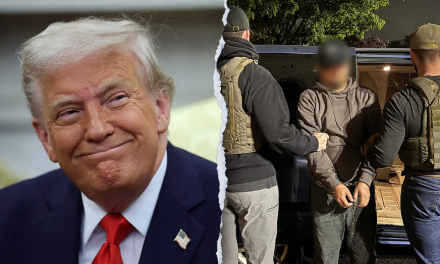In recent times, a growing number of conversations surrounding gender identity and the experiences of marginalized groups have created a complex dialogue about what it truly means for children to navigate their identities. Among the voices seeking to bring attention to this topic is a former U.S. Army veteran who has publicly shared her experience of detransitioning. Her message resonates powerfully: it is time for parents to speak up and protect the innocence of their children.
This veteran, a mother herself, reflects on her personal journey of transitioning to identify as male before eventually embracing her biological gender. Today, she advocates for the rights of children to experience childhood free from the rigid constraints of societal expectations surrounding gender. Her perspective brings a unique insight, combining her military discipline and her lived experiences to bolster her message.
“Let kids be kids,” she urges passionately during a recent interview. “They should have the space to explore who they are without pressure from outside forces.” This sentiment echoes the concerns of many parents who have observed an increasing trend in the medical and cultural landscape concerning minors and gender identity.
The veteran’s story begins as a teenage girl grappling with feelings of disconnection from her body and identity. Feeling lost and misunderstood, she began her transition in hopes of finding clarity and belonging. However, after several years of living as a man and undergoing various medical procedures, she experienced a shift in perspective that led to her decision to detransition.
“Transitioning seemed like an answer at the time,” she explains. “But in retrospect, it felt like I was following a path laid out by an ideology rather than a genuine understanding of myself.” Her realization, followed by the physical and emotional struggles of detransitioning, spurred her commitment to help others, particularly children, navigate gender identity issues with greater caution.
Her advocacy places a strong emphasis on the unique developmental phases of childhood. Experts in child psychology have long maintained that children are not equipped to make lifelong decisions regarding their gender identity, particularly under the societal pressures that are increasingly commonplace. “One of the biggest mistakes I see is medical professionals rushing the process and not allowing children the time and space to understand themselves,” she states, highlighting how critical it is for parents to remain involved and informed.
In her view, parents hold the primary responsibility to guide their children through these formative years. She encourages a dialogue that prioritizes open communication and unconditional love without imposing rigid labels. “Parents need to be aware of what their kids are thinking and feeling. Sometimes children need to explore their feelings about gender, but that exploration shouldn’t feel like a race to an irreversible decision,” she insists.
The issue has rapidly gained national attention, igniting passionate debates on educational platforms and social media. Many parents express concerns over schools implementing gender identity curricula without parental input, creating an environment where children might feel compelled to conform to certain identities without fully understanding their implications.
“Teaching kids about gender diversity is important, but it needs to be done in a sensitive way that doesn’t pressure them into identifying as something they might not truly understand,” she remarks. This perspective certainly resonates among a significant number of parents who feel ill-equipped to address their children’s inquiries in the face of rapidly evolving social dynamics around gender identity.
Additionally, the veteran highlights the growing role of social media in shaping young minds. With platforms teeming with influencers challenging traditional notions of gender, children often feel inundated with messages pushing them to label themselves in a specific way. “It’s crucial for parents to monitor their child’s online world and engage them in critical conversations about what they see,” she advises, underscoring the need for critical thinking in today’s digital age.
Her advocacy is also fueled by a concern for those who may get lost in the complexities of their emotions. “A lot of kids might be confused or simply want to fit in,” she notes. “But that confusion can lead them down a path of irreversible changes that they might regret later on.” Her message urges parents to foster environments where children feel safe expressing their thoughts without the fear of judgment or misunderstanding.
Detransitioning is a delicate subject and one that must be approached with empathy and respect for personal experiences. This veteran’s story is emblematic of the internal battles many individuals face, as well as the reflections that stem from such significant life choices. She believes that sharing her narrative could help others reconsider the implications of transitioning at a young age.
The ongoing discussion about the medicalization of gender identity in children has also attracted attention from policymakers. Some states within the U.S. have begun to implement legislation that restricts access to hormone therapies and puberty blockers for minors, aimed at addressing ethical concerns regarding the implications of such medical interventions.
As the conversation continues to evolve, the veteran urges both sides to engage with one another respectfully. “We need to come together, not as adversaries, but as a community wanting the best for our children,” she emphasizes. It is a call for unity that transcends politics, focusing on the well-being of the youngest members of society.
Within this framework, the veteran positions her advocacy as a constructive dialog to educate parents, children, and educators alike. She speaks at forums, participates in panel discussions, and contributes to publications, hoping to shine a light on the necessity of cautious exploration of gender identity, particularly among vulnerable youth.
Yet she does not reject the validity of trans identities; rather, she emphasizes the importance of understanding oneself first, advocating for comprehensive education and informed consent. “I’m not anti-trans; I’m anti-rushing into things that can change your life forever,” she clarifies.
As she continues her advocacy, the former Army vet remains hopeful. By speaking out, she hopes to initiate important conversations and ensure that the childhood experience remains joyful and exploratory. “We have a responsibility to nurture our children’s curiosity and to help them discover what identity means in a gentle, guided approach,” she concludes.
Ultimately, her message for parents resounds with urgency and care: “Be involved. Listen. Allow your kids to be kids.” It’s a call to action to prioritize their children’s welfare above societal pressures, ensuring they grow into confident adults grounded in self-knowledge rather than superficial labels imposed by the world around them.
































